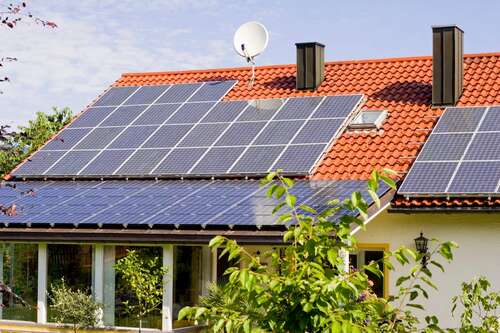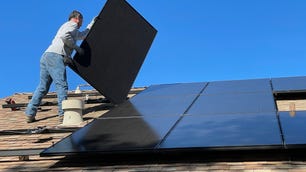Solar panels can save you money on your electrical bills, but will those savings be lessened by higher property taxes? Houses with solar panels can rise considerably in value, potentially increasing your property taxes in some states as well.
Many state governments encourage solar panels by exempting solar installations from property taxes, which lets you boost the value of your home with solar while keeping the same tax base, or limiting its increase. Other states exempt solar panels from sales taxes — which can mean saving up to 5% in taxes on a purchase that costs tens of thousands of dollars — and some states offer exemptions for both types of taxes.
Learn everything you need to know about solar panels and about sales and property tax exemptions.
More on solar upgrades:
What are property taxes?
Property taxes are fees levied by governments on individuals and organizations for ownership of specific types of property. The most common property taxes are for real property, or real estate — buildings or land, but they can also apply to property like boats, cars and other vehicles.
Property taxes are generally “ad valorum” taxes, meaning that taxes are based on assessed values of property. As the appraisal price of property increases, so do the property taxes (depending on the rules for assessing the property).
In the US, property taxes are controlled by state and local governments. Property taxes fund programs such as law enforcement, fire protection, schools, libraries and other local infrastructure. There is no federal property tax.
Real property tax rates in the US range from as low as 0.31% in Hawaii to as high as 2.21% in New Jersey, according to 2020 census data provided by the Tax Foundation.
How much do solar panels increase the value of my house?
According to the National Renewable Energy Laboratory, the value of your home increases $20 for every $1 in annual savings on utility bills.
Data from the Energy Information Administration shows that the average monthly US home electrical bill in 2022 was $137. If your solar panels were powerful enough to provide all of that electricity, you would save $1,644 a year.
Using the NREL “$20 for $1” rule above with utility data from 2022, a new solar installation would increase the value of an American home by an average of $32,880. Of course, the actual increase in your home’s value would depend on several factors like location and size of your home, type of solar installation, price of local electricity and net metering laws in your state.
How do solar panels impact my property taxes?
Solar panels can increase the value of your home. When a home improvement project raises the value of property, your local government can reassess the value of the home to determine a new base tax value.
Without laws to exempt solar panels from property tax increases, the new, higher value of your home may incur an increase in your property tax.

If your state doesn’t exempt solar panels from property taxes, a new installation could lead to a higher tax bill.
For example, another common method for estimating the impact of solar panels on your home’s value is that they’ll increase it by an average of 4.1%. That’s based on a Zillow survey from 2019.
If you live in Texas and own a $500,000 home, you’ll currently pay about $8,300 in annual property taxes at the state’s rate of 1.66%.
If a new solar installation raises that home’s value by 4.1%, it could then be assessed at $520,500, which could increase your property taxes to $8,430, or $340 more a year. Luckily for Texans, solar panels are 100% exempt from property tax increases.
How do property tax exemptions for solar panels work?
Essentially, property tax exemptions for solar panels will subtract the value of your solar installation — or a portion of it — from the assessed value of your home. If your house is worth $300,000, and you install solar panels with a total value of $20,000, a property tax exemption would keep the assessed value of your house at $300,000, not $320,000.
In most cases, you will need to apply for the property tax exemption, sometimes before the installation of your solar panels. Visit your state’s department of taxation or revenue to find the process for claiming the property tax exemption in your state or city.
How do sales tax exemptions for solar panels work?
Sales tax exemptions for solar means that the equipment purchased — such as solar panels, inverters, racking systems or optimizers — isn’t subject to the usual local consumption taxes.
Most states charge sales tax for purchases of items and services. These state taxes range from 2.9% in Colorado to 7.25% in California. Five states — Alaska, Delaware, Montana, New Hampshire and Oregon — don’t charge any sales tax for any purchases.
Similar to property tax exemptions, many states will require an application for the sales tax exemption on solar equipment.
Which states exempt solar panels from property taxes and sales taxes?
Of the 50 US states and Washington, DC, 31 governments provide some sort of property tax exemption or exclusion for solar panels. Some states provide a property tax exemption for a limited time, such as 10 years, while others exempt solar panels forever (or until state politicians change the law).
Also, 16 states provide some form of sales tax exemption for solar energy equipment. Some sales tax exemptions include only solar panels, while others include everything but transformers and monitoring equipment, and still others exempt all related solar equipment.
Most of the property tax exemptions include the total value of your solar installation, but some provide a partial exemption based on a percentage of its value. State and local laws can change quickly or be impacted by court decisions — an August 2022 ruling by the Missouri Supreme Court has left the state’s solar property tax exemption in limbo.
Use the information and links below to check your state or district’s current laws for solar panel property tax and sales tax exemptions. Please note that this chart includes tax exemptions for residential solar installations. Some states provide exemptions for large-scale industrial solar installations but not home solar panels.
State property and sales tax exemptions for solar panels
Note: This chart is accurate as of June 16, 2023. State law changes may have occurred after this date. Check your state’s department of taxation for the latest rules on tax exemptions for residential solar installations.
Do solar panels increase property taxes in states without exemptions?
Solar panels certainly could increase your property taxes in a state and city with no property tax exemptions for solar installations, but it will depend on the assessment process specific to your locale.
In general, adding solar panels to your home will increase your property tax in states without property tax exemptions for solar installations. If your state doesn’t offer a property tax exemption, you should contact your local assessor’s office to ask specifically how solar panels will impact your property tax. To find your local assessor, search Google with your county name, state name and the word “assessor.”
Why do different states and cities have different rules for solar panel property tax exemptions?
Government support for residential solar energy varies from state to state and from city to city. While the US Department of Energy strongly encourages local governments to support solar power, it’s up to each area’s elected officials to pass the legislation that establishes tax exemptions for solar installations.
Suzanne Leta, head of policy and strategy for leading solar provider SunPower, told CNET that “70 million Americans could save money with rooftop solar today, and yet only 4 million or so actually have rooftop solar.”
Leta continued, “in many states, there are a lot of decision makers who see the important consumer value of solar, and the environmental value as well. They have structured their tax policy and other incentive policy in order to bring down the cost of the technology so that more consumers can access the benefits.”
In some cases where a state doesn’t provide solar incentives, municipal governments have stepped in to pick up the slack. For example, Ohio does not provide any state tax incentives for solar installations, but the cities of Cleveland and Cincinnati offer significant local property tax abatements.
Tax laws for solar energy installations can change from one state legislative session to another. If you support tax incentives for solar energy and your state does not offer them, contact your state’s legislature to let them know what you think.
Correction, June 16: An earlier version of this article misstated the situation in Alabama. There isn’t a state property tax exemption for solar panels there.


